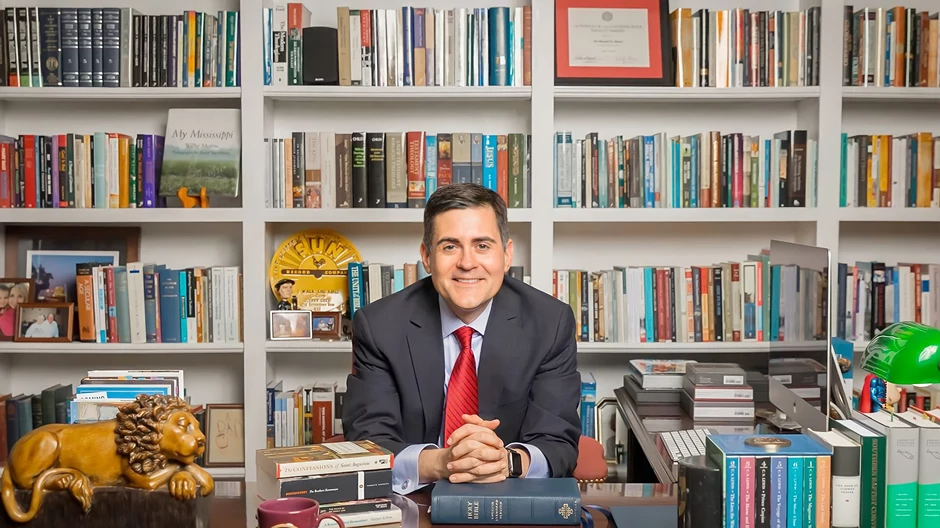
Kaitlyn Finchler
Contributing Writer
When looking at the religious versus the secular, most think it may be all or nothing. But that isn’t always the case — religion, demographics, politics and culture have always been intertwined.
Russell Moore, editor in chief of Christianity Today and the former president of the Southern Baptist Convention’s Ethics & Religious Liberty Commission, will deliver his lecture, “Secular Episcopalians vs. Secular Pentecostals: Why the Crisis of American Religion Matters for Everybody,” at 2 p.m. today in the Hall of Philosophy, closing the Week Nine Interfaith Lecture Series theme, “Past Informs Present: Traditioned Innovation in Spiritual Life.”
“I’m wanting to talk about the changing religious landscape in American life — that it’s not what really any side in the culture war expected,” Moore said. “There has been secularization, but it’s worked in both directions and it’s worked differently.”
This shows a secularized left, or secularized Episcopalians, with the collapse of mainline Protestantism and the rise of the “nones.” As well as on the right, there’s a move toward a populist, politicized religious movement where politics and tribalism have replaced the “theological anchor,” he said.
“If people don’t understand what’s happening in American culture, in American politics or even in American technology, not to understand those things means a blinkered vision,” Moore said.
While it’s not as much about moving left or right politically, Moore said a shift in fundamental priorities, such as when religion becomes a “means to some other end,” changes the nature of the religion.
“One of the most important aspects of American religion and of the American church particularly, is as one of those places in the founding era of American life that demonstrated that the state is not everything,” Moore said. “Politics is not everything. When that becomes another vehicle of politics, you really lose that check on state power.”
To further his lecture, Moore said the same patterns in the Episcopal Church on the American left — urban, professional, highly educated and “in many ways, beleaguered” — can be seen on the American right and in Pentecostalism with decreased concern about character in leadership, prosperity, gospel themes and populist rhetoric.
“Those sort of things that were kind of test run in those religious communities have now happened in a broader framework,” he said. “I think there are a lot of factors, but one of those being class differences. So, you see the same sorts of distinctions that you see with, say, the political differences between highly educated and less-educated American voters.”
The rhetoric of Christian nationalists presents a challenge to the entire country, Moore said. It’s symptomatic of something seen across the world, such as with Islamic nationalism and Hindu nationalism.
“It has a number of implications,” he said. “One of them being there are a lot of people who associate Christian nationalism with Christianity itself. And so, they move away from Christianity because of what they have seen. The other is that you have increased sorting in American church life, very few purple congregations anymore. People tend to be, with a few exceptions, mostly in congregations that think politically and vote the same way they do.”
Moore said he hopes the audience gains “a little deeper insight” into what’s happening in American religion and how it affects even those who are nonreligious, or of different faiths in American life.
“You can see trends happening in religious bodies that later pick up in the broader culture,” he said. “Religion has with it an inherent power either for good or for evil — we’ve seen it used in both ways. When you have a loss of genuine authority, often the traction to that is authoritarianism.”
For a long time, Moore said there was a hope among nonreligious Americans that religion would “wither away” and complete secularization would evolve.
“I think we’re at a place right now where we can see that that’s not how things are going to play out, even for those who hoped it would be,” he said. “I would argue that’s not what we should be hoping for in any case.”
There’s a difficulty around defining what people mean by being religious, Moore said. There’s different metrics — such as church attendance and engagement, self-identification and theological commitment — which are hard to measure.
“Let’s say my kind of person would have wanted a revival of genuinely vibrant, theologically oriented evangelical Christianity,” Moore said. “That’s not happening either. So, it’s a completely different present that we find ourselves in than that most people prepared for.”




